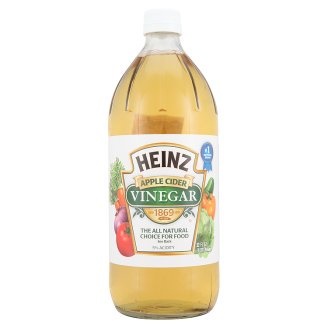apple cider vinegar is halal or haram in the United States?

Apple cider vinegar is considered halal ✅ according to Islamic dietary guidelines. This vinegar is made from fermented apples, which are permissible to consume in Islam. It does not contain any added alcohol, as the alcohol content evaporates during the fermentation process. Muslims around the world use apple cider vinegar for various health benefits and culinary purposes. However, it is important to check the ingredients and ensure that it is pure apple cider vinegar without any added substances. As long as it meets these criteria, apple cider vinegar is deemed halal and can be enjoyed by Muslims.
About apple cider vinegar or haram in the United States
Apple cider vinegar is a popular household ingredient known for its numerous health benefits and versatile uses. Made from fermented apples, this amber-colored liquid has been utilized for centuries as both a natural remedy and a culinary ingredient. With a rich history dating back to ancient times, apple cider vinegar continues to gain recognition in modern society for its potential health-promoting properties.
One of the main reasons that apple cider vinegar has become ingrained in our culture is its potential to aid in digestion and weight management. It is believed that the acetic acid present in vinegar may help to promote the breakdown of fats and improve metabolism. Additionally, apple cider vinegar is purported to lower blood sugar levels and improve insulin sensitivity, making it a popular choice for individuals with type 2 diabetes or those seeking to stabilize their blood sugar levels.
Furthermore, apple cider vinegar is recognized for its antimicrobial properties, which may help fight against certain bacteria and viruses. It is often utilized as a natural disinfectant in household cleaning, as well as a soothing agent for skin ailments such as acne and sunburns.
In addition to its health benefits, apple cider vinegar is also used in various culinary applications. Its distinct tangy flavor makes it a versatile ingredient in dressings, marinades, and sauces. Moreover, it is sometimes consumed diluted in water as a refreshing beverage or incorporated into other beverages for enhanced flavor.
In conclusion, apple cider vinegar is a widely recognized and utilized ingredient known for its potential health benefits and culinary applications. Its versatile nature and rich history have solidified its place as a pantry staple in many households around the world.
apple cider vinegar or haram in the United States Halal Certification
Apple cider vinegar is a popular condiment made from fermented apple juice. It has gained notoriety for its potential health benefits, including aiding digestion, balancing blood sugar levels, and promoting weight loss. In the United States, apple cider vinegar is widely available in supermarkets and health food stores, both in its organic and non-organic forms.
When it comes to halal certification, it is important to note that the Islamic dietary laws dictate what is considered permissible (halal) or prohibited (haram) for Muslims to consume. In the United States, various certification agencies are responsible for verifying whether a product meets halal standards.
Apple cider vinegar itself does not contain any haram ingredients, as it is simply made from fermented apple juice. However, to ensure halal compliance, some Muslims may prefer to seek products that have obtained halal certification. Such certification involves a thorough review of the production process and ingredients to ensure adherence to Islamic dietary guidelines.
In the United States, several halal certification agencies exist, such as the Islamic Food and Nutrition Council of America (IFANCA) and the Halal Food Standards Alliance of America (HFSAA). These organizations evaluate products and facilities, granting halal certification if the standards are met.
In summary, apple cider vinegar, in its natural form, does not typically pose any concerns from a halal perspective. However, individuals following halal dietary guidelines may choose to seek products with halal certification for their peace of mind. By choosing certified products, Muslims in the United States can be confident that their consumption aligns with their religious beliefs.
Is apple cider vinegar or haram? Conclusion
In conclusion, the question of whether apple cider vinegar is halal or haram is subjective, as it depends on various factors and interpretations within the Islamic faith. Apple cider vinegar is essentially made by fermenting apple juice, which is a natural process. In general, many scholars and experts consider apple cider vinegar to be halal due to its natural origin and lack of direct prohibition in the Quran or Hadith.
The main concern related to the halal status of vinegar stems from the possibility of it being derived from alcohol, which is strictly prohibited in Islam. However, when alcohol undergoes a complete transformation through fermentation into vinegar, it is generally believed to become permissible. The fermentation process converts the alcohol into acetic acid, eliminating the intoxicating properties and rendering it suitable for consumption.
It is important to note that the halal certification process for apple cider vinegar can vary from one country to another, as well as among different Islamic organizations. Therefore, it is advisable for individuals to look for products with reputable halal certifications to ensure they align with their personal beliefs and adhere to their specific interpretation of Islamic dietary laws.
Ultimately, determining the halal or haram status of apple cider vinegar should involve considering the specific production methods, ingredients, and certification. Seeking guidance from knowledgeable religious scholars or organizations can offer further clarification and reassurance for individuals who may have specific concerns regarding the consumption of apple cider vinegar in relation to their Islamic beliefs.
FAQs On apple cider vinegar is halal or haram
Q1: Is apple cider vinegar halal or haram?
A1: Apple cider vinegar is generally considered halal as it is made from fermented apples, and the process of fermentation is permissible in Islam.
Q2: Does the source of the apple cider vinegar determine its halal or haram status?
A2: No, the source of the vinegar does not impact its halal or haram status. As long as it is made from permissible ingredients and does not undergo any haram processes, it remains halal.
Q3: Is there a specific certification or label I should look for when purchasing apple cider vinegar to ensure it is halal?
A3: While some halal certifying bodies may offer certifications for apple cider vinegar, it is not mandatory to have a specific label. You can check the ingredients and production process to ensure it is halal.
Q4: Can apple cider vinegar containing alcohol be considered halal?
A4: If the apple cider vinegar contains a negligible amount of alcohol, usually less than 0.5%, it is still deemed halal as long as it does not cause intoxication or change the nature of the vinegar.
Q5: Are there any flavorings or additives commonly added to apple cider vinegar that render it haram?
A5: Additives and flavorings may impact the halal status of apple cider vinegar. It is essential to check the ingredients list for any haram substances such as alcohol-based flavors or animal-derived additives.
Q6: Can I use apple cider vinegar that has not been certified halal by a recognized authority?
A6: Yes, you can use apple cider vinegar that does not have a specific halal certification as long as you have verified its ingredients and production process to be in compliance with Islamic dietary guidelines.
Q7: Is all non-alcoholic apple cider vinegar automatically halal?
A7: Non-alcoholic apple cider vinegar is commonly considered halal, given that the alcohol content is within permissible limits or has been completely eliminated during the production process.
Q8: Is there any specific method of preparation that makes apple cider vinegar haram?
A8: Yes, if the process of preparing apple cider vinegar involves haram elements, such as using haram ingredients or employing non-permissible methods of extraction, it would be considered haram.
Q9: Can apple cider vinegar be used in cooking if I am following a halal diet?
A9: Yes, apple cider vinegar can be used in cooking as long as it meets the halal certification requirements or if its ingredients and production process have been verified to be halal.
Q10: Are there any specific rulings or guidelines regarding the consumption of apple cider vinegar for Muslims?
A10: There are no specific rulings or guidelines on the consumption of apple cider vinegar for Muslims. However, it is always recommended to ensure the product aligns with Islamic dietary guidelines before use.

Hello, fellow explorers and cultural enthusiasts! I’m Sacide Tuba Barkçin, the heart and soul behind ‘Halal Travel Style’. My passion for travel is not just a hobby, it’s a way of life. From bustling city streets to serene natural landscapes, I’ve been fortunate enough to traverse diverse terrains and immerse myself in various cultures.
My journey is not just about seeing new places; it’s about experiencing the world through the lens of Halal. Every destination I visit, every story I write, is a testament to the harmony of travel and faith. I believe that exploring the world should not compromise our beliefs, but rather enhance our understanding and appreciation of them.
Join me as I navigate the globe, one Halal experience at a time. Whether you’re a seasoned traveler or just starting your journey, I hope to inspire you to explore the world with faith and style.
